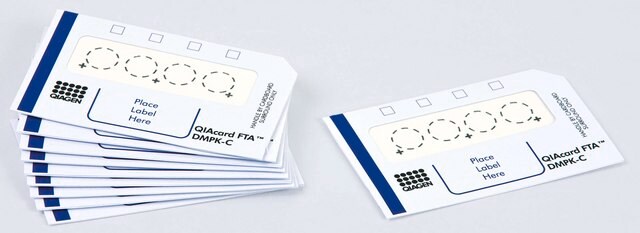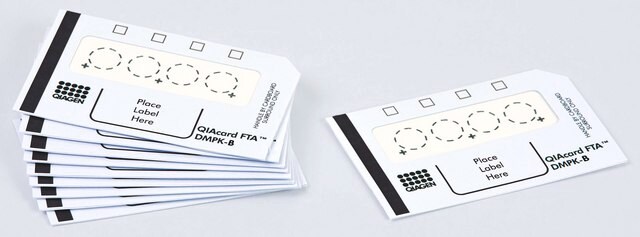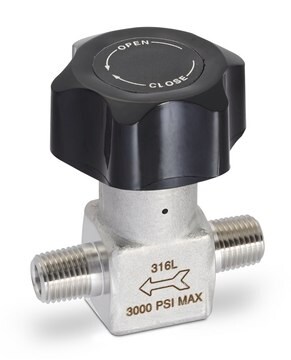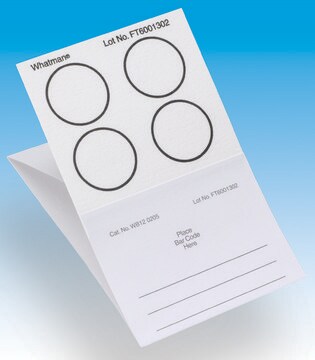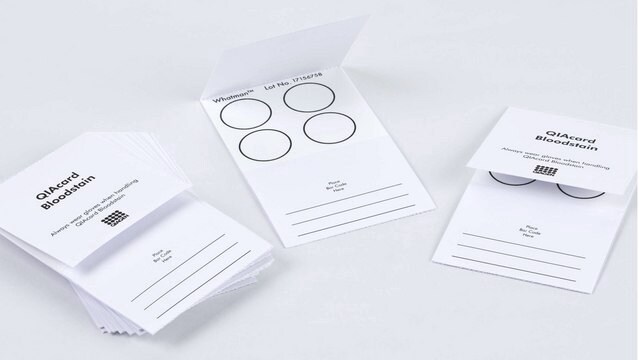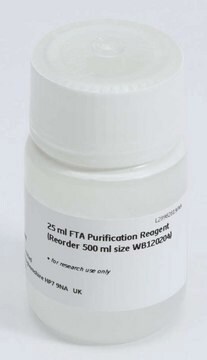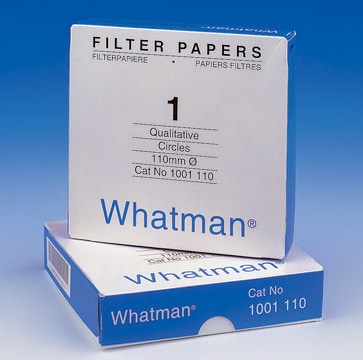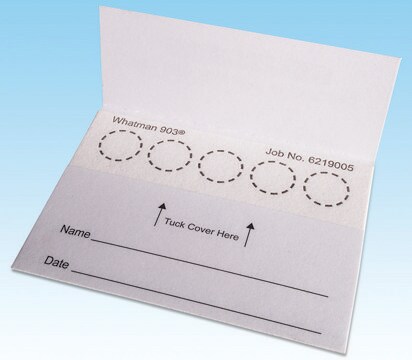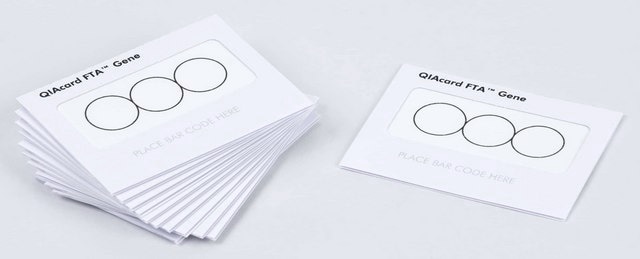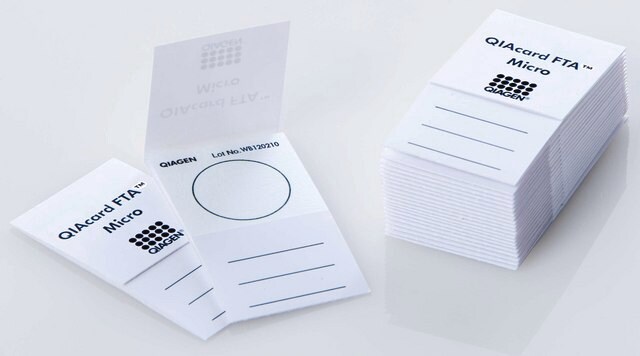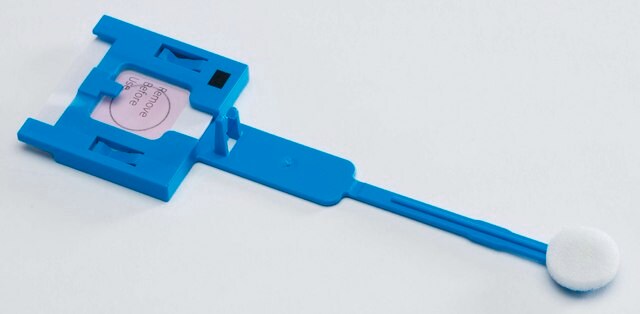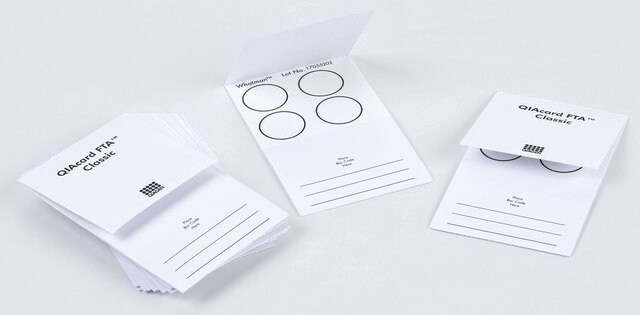WHAWB129241
QIAcard™ FTA™ DMPK Cards
FTA DMPK-A card, 4 sample areas per card, pack of 100 cards
Sinônimo(s):
QIAcard™ FTA™ DMPK-A (100), whatman dmpk, whatman fta
Faça loginpara ver os preços organizacionais e de contrato
About This Item
Código UNSPSC:
41105500
NACRES:
NB.22
Produtos recomendados
Materiais
white
fabricante/nome comercial
Qiagen WB129241
embalagem
pack of 100 cards
Procurando produtos similares? Visita Guia de comparação de produtos
Descrição geral
Drug Metabolism (DM) Pharmacokinetic (PK) studies provide crucial insight into the way drug candidates behave in the body. These studies are a critical step in drug development.
QIAcard™ FTA™ DMPK Cards for Drug Metabolism Pharmacokinetics enable microvolume sampling with only 10 to 20 µl per sample and are designed for use with blood samples. The cards can also be used with colorless samples such as plasma, cerebrospinal fluid and urine.
QIAcard™ FTA™ DMPK-A contains impregnated chemicals enabling protein denaturation to inactivate endogenous enzymes. Cell lysis releases endogenous cellular materials onto card. Stabilization of DNA allows resampling of blood spot for pharmacogenomics. Impregnated chemicals may interfere with mass spectrometry detection e.g. ion suppression.
QIAcard™ FTA™ DMPK Cards for Drug Metabolism Pharmacokinetics enable microvolume sampling with only 10 to 20 µl per sample and are designed for use with blood samples. The cards can also be used with colorless samples such as plasma, cerebrospinal fluid and urine.
QIAcard™ FTA™ DMPK-A contains impregnated chemicals enabling protein denaturation to inactivate endogenous enzymes. Cell lysis releases endogenous cellular materials onto card. Stabilization of DNA allows resampling of blood spot for pharmacogenomics. Impregnated chemicals may interfere with mass spectrometry detection e.g. ion suppression.
Características e benefícios
- DBS microvolume sampling requires only 10—20 μl per sample.
- Consistent data are obtained through more serial sampling from individual animals.
- Less reliance on composite data.
- The 3-step DBS procedure is more straightforward than the cumbersome centrifugation, isolation and clean-up of plasma.
- Conveys greater analyte stability through on-substrate clean-up, especially for enzyme-sensitive compounds.
- Room temperature stability saves on cost of dry ice shipments and allows remote sampling.
Outras notas
Analysis is primarily with HPLC or UHPLC followed by MS/MS detection, direct desorption MS techniques such as DESI. Methanol or aqueous/organic mixtures have been shown to work well for small molecules and aqueous buffers are recommended for proteins. Select a good solvent for the analyte while maintaining compatibility with the HPLC conditions to be used. The choice of DMPK card depends on many factors such as the analyte chemical structure, extraction solvent and analysis workflow.
Field of Use : For internal research use only
Field of Use : For internal research use only
Informações legais
FTA is a trademark of Qiagen Group
QIAcard is a trademark of Qiagen Group
Escolha uma das versões mais recentes:
Certificados de análise (COA)
Lot/Batch Number
Lamentamos, não temos COA para este produto disponíveis online no momento.
Se precisar de ajuda, entre em contato Atendimento ao cliente
Já possui este produto?
Encontre a documentação dos produtos que você adquiriu recentemente na biblioteca de documentos.
Os clientes também visualizaram
Matthew Barfield et al.
Analytical chemistry, 83(1), 118-124 (2010-12-09)
A novel approach has been developed for the quantitative determination of circulating drug concentrations in clinical studies using dried plasma spots (DPS) on paper substrates, rather than conventional plasma samples. A quantitative bioanalytical high-pressure liquid chromatography-tandem mass spectrometry (HPLC-MS/MS) assay
Neil Spooner et al.
Analytical chemistry, 81(4), 1557-1563 (2009-01-22)
A novel approach has been developed for the quantitative determination of circulating drug concentrations in clinical studies using dried blood spots (DBS) on paper, rather than conventional plasma samples. A quantitative bioanalytical HPLC-MS/MS assay requiring small blood volumes (15 microL)
Nossa equipe de cientistas tem experiência em todas as áreas de pesquisa, incluindo Life Sciences, ciência de materiais, síntese química, cromatografia, química analítica e muitas outras.
Entre em contato com a assistência técnica